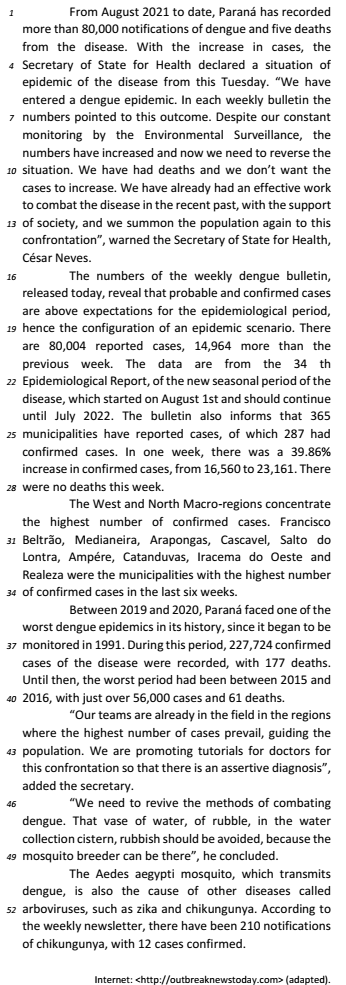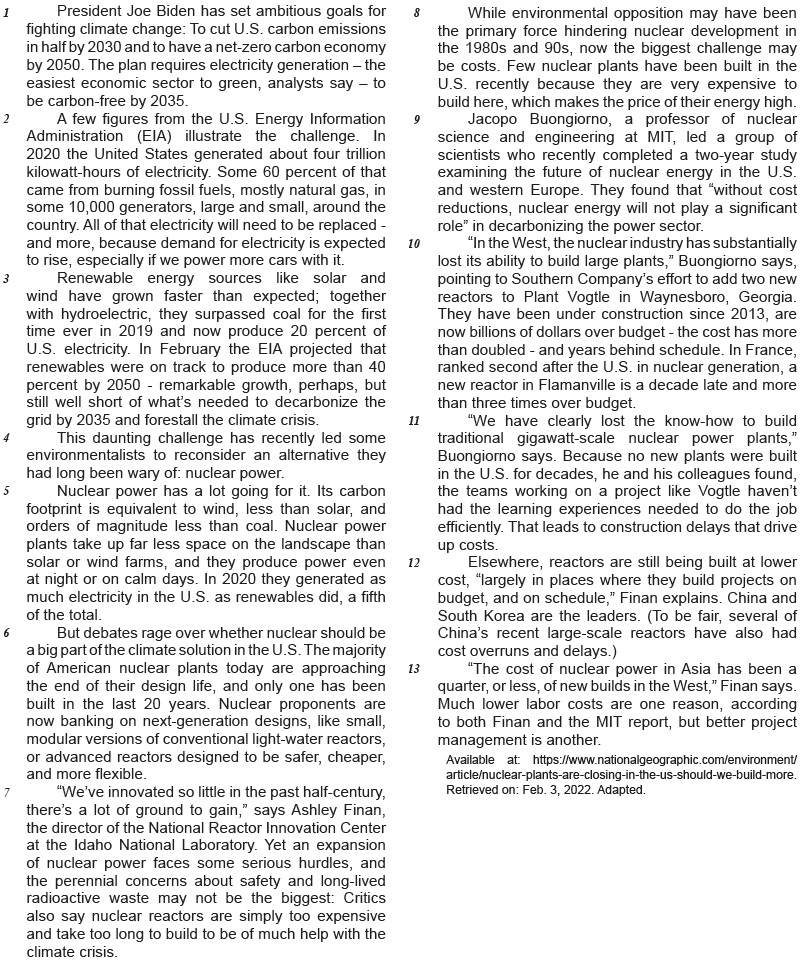Questões de Concurso
Sobre sinônimos | synonyms em inglês
Foram encontradas 1.298 questões
Considering the ideas and the vocabulary presented in the text, mark the following items as right (C) or wrong (E).
In line 41, the word “foes” could be replaced with
business counterparts without changing the meaning of
the sentence.
Considering the ideas and the vocabulary of the text above, decide whether the statements below are right (C) or wrong (E).
In lines 2, 11, and 12, the word “breach” could not be
replaced by severance in any of the situations without
changing the meaning of the sentences.
Considering the ideas and the vocabulary of the text above, decide whether the statements below are right (C) or wrong (E).
In lines 10 to 12, in the passage “this is more
straightforward when no formal breach of relations has
taken place”, “more straightforward” could be replaced
by less complex without changing the meaning of
the sentence.
Considering the ideas and the vocabulary presented in the text, mark the following items as right (C) or wrong (E).
The word “acute” (line 27) could be replaced with
mutual without changing the meaning of the sentence.
Considering the ideas and the vocabulary presented in the text, mark the following items as right (C) or wrong (E).
In line 34, the word “allegiance” could be replaced
with loyalty without changing the meaning of the
sentence.
Considering the ideas and the vocabulary presented in the text, mark the following items as right (C) or wrong (E).
In line 21, the word “fancy” could be replaced with
whim without changing the meaning of the sentence.
Text for the items from.

It would be grammatically correct and it would not change the meaning of the sentence if the preposition “above” was replaced by the preposition below in the sentence: The numbers of the weekly dengue bulletin, released today, reveal that probable and confirmed cases are below expectations for the epidemiological period.
Text for the items from.

In the sentence “Despite our constant monitoring by the Environmental Surveillance, the numbers have increased and now we need to reverse the situation” (lines from 7 to 10), “Despite” can be correctly replaced by In spite of.
The controversial future of nuclear power in the U.S.
Lois Parshley

Judge the item from.
In the sentence “Mingming is less energetic than
usual” (lines 3 and 4), the opposite of “less energetic” is
more energetic.
(3º§) "As she waited for sniffer dogs to check her bag, she wasn't too concerned about the Russian military build-up on Ukraine's borders."
I.The word "sniffer dogs" could be translated as "cães farejadores".
II.The word "waited" is a verb.
III.The word "concerned" could be replaced by "aid".
Which one(s) is(are) CORRECT?
Based on the text above and the vocabulary used in it, judge the following item.
The noun “revenues” (at the end of the text) could be
correctly replaced by renewals without any change in the
meaning of the sentence.
Leaders at tech companies around the world could face up to two years in prison in the United Kingdom if they do not comply with new online safety laws.
Draft legislation aims to crack down on social media and other online entities to ensure safety and privacy for users, particularly children. The laws were drafted to prevent uploading and spreading of harmful content such as racism, bullying, fraud and sexual abuse.
While the legislation has been criticized by Parliament members in the past, the new draft has received bipartisan support.
The bill has to be voted on by British lawmakers.
The legislation has been updated several times since its inception. Among the changes are hefty fines or blockages if networks fail to remove harmful content after being notified of its existence, as well as the labeling of sending unsolicited nudes as a criminal offense.
The fines could be up to 10 percent of the affected company’s annual global income. The Office of Communications (Ofcom), the bill’s regulator, has been granted legal grounds to request information from companies they suspect of not following the bill’s rules.
If Ofcom is able to prove that the companies withheld information or have not responded properly to notifications of inappropriate or illegal content, the executives would be held criminally liable. This part of the law will be enforced two months after the law itself is enacted, meaning companies and websites will have time to crack down on their content before facing legal consequences.
Some U.K. residents have pushed back against the new version of the bill, including memes from the Open Rights Group. The organization claims that, despite good intentions, the regulations could result in a slippery slope that could end up violating free speech.
Internet:
Considering the text presented above and the vocabulary used in it, judge the following item.
The word “liable” (at the end of the first sentence of the
seventh paragraph) could be correctly replaced by liar
without changing the meaning of the text.
Judge the following item considering the text above and the vocabulary used in it.
The word “Therefore” (in the fourth sentence of the second
paragraph) could be correctly replaced by Henceforth
without any change in the meaning of the text.
Judge the following item considering the text above and the vocabulary used in it.
In the second paragraph, the word “audit” is synonymous
with audition.
Judge the following item considering the text above and the vocabulary used in it.
The word “reliant” (in the second sentence of the first
paragraph) could be correctly replaced by dependent
without any change in the meaning of the text.
During a ransomware hack, attackers infiltrate a target’s computer system and encrypt its data. They then demand a payment before they will release the decryption key to free the system. This type of extortion has existed for decades, but in the 2010s it exploded in popularity, with online gangs holding local governments, infrastructure and even hospitals hostage. Ransomware is a collective problem—and solving it will require collaborative action from companies, the government and international partners.
As long as victims keep paying, hackers will keep profiting from this type of attack. But cybersecurity experts are divided on whether the government should prohibit the paying of ransoms. Such a ban would disincentivize hackers, but it would also place some organizations in a moral quandary. For, say, a hospital, unlocking the computer systems as quickly as possible could be a matter of life or death for patients, and the fastest option may be to pay up.
Collective action can help. If all organizations that fall victim to ransomware report their attacks, they will contribute to a trove of valuable data, which can be used to strike back against attackers. For example, certain ransomware gangs may use the exact same type of encryption in all their attacks. “White hat” hackers can and do study these trends, which allows them to retrieve and publish the decryption keys for specific types of ransomware. Many companies, however, remain reluctant to admit they have experienced a breach, wishing to avoid potential bad press. Overcoming that reluctance may require legislation, such as a bill introduced in the Senate last year that would require companies to report having paid a ransom within 24 hours of the transaction.
Internet:<www.scientificamerican.com>
In the second paragraph of the text,
the word “disincentivize” could be correctly replaced by
deter without any change in the meaning of the sentence.





